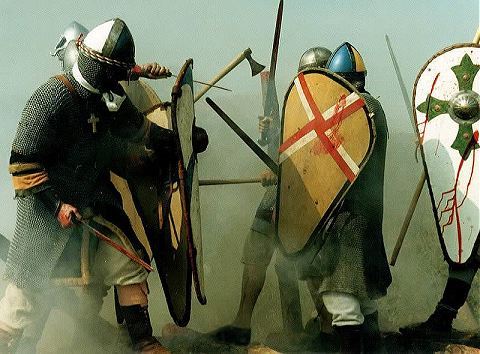Warfare

This page does not support Netscape or Opera and was made with NOTEPAD
In Beowulf warfare is one of the main themes. The author glorifies wars and battles, portraying them as heroic and honorable events. Reading this poem it seems that "in [the] warrior society, the values of which the poem constantly invokes," (p 23), bloodshed is a way of life, and the dominant characteristic of this culture. Combat settles feuds and territorial disputes, determines a person's worth through bravery and victory, and is the only form of justice available.
Battles are portrayed as signs of heroism. The warriors brag about their victorious clashes and boast about future adventures. One is dishonored if found guilty of cowardliness, as it happens to Unferth. An ideal warrior is fearless, and heroic. The author supports this idea through his description of a commendable Danish leader Scyld Scefing, who takes "mead - benches away from enemy bands, from many tribes, [and] terrifie[s] their nobles." (p 27) Beowulf, the main character further supports these ideas. He proves himself a hero through courage and victory. He defeats enemy tribes, monsters galore, including Grendel and his mother and in the end the dragon. His success in warfare and glory in battle obtains him respect and allows him to become a good leader. His ideology that "fate often saves an undoomed man when his courage is good" (p 35) is the example of an ideal warrior of the time.
The poem depicts war and revenge as the only form of justice in Beowulf's world. "Men seem to be caught in a vast web of reprisals and conterreprisals from which there is little hope of escape." (p 24) If a relative or a friend has been slain it is your duty to avenge their death with death of the murderer. The poems plot is saturated with retributions: Grendel's mother's revenge for the death of her son, Beowulf seeks revenge after the dragon destroys his hall, king Hrethel can not find peace with himself because he can't take revenge for the accidental death of his son, etc. Beowulf himself is a primary example of this cultural practice. He tells Hrothgar (who's mourning the murderous death of Aechere) that "It's better for a man to avenge his friend than much mourn." (p 45)
The methods of ending the feuds through marriages, and wergilds, were often unsuccessful. Unfulfilled feelings of bitterness stay and grow in the minds of the men until they are unleashed in violence. Older warriors "will provoke and remind [the younger warriors] at every chance with wounding words until the moment comes that the woman's thane, forfeiting life, shall lay dead, blood-smeared from the sword-bite, for his father's deeds." (p 53) Thus creating a chain of never-ending feuds and bloodshed, "an the aspect of [this] poem that is apt to make the most powerful impression on the reader - its strong sense of doom." (p 24)
The poem shows a war as the principal factor in this society. The author glorifies war, constantly emphasizing it as heroic, virtuous and justifiable. In this society wisdom and kindness are admired human characteristics they are not nearly glorified as bravery. And battle seems to be the solution to disputes and the only access to veneration or afterlife. What contradicts all the glory and glitter of the gratifying aspects of war are insights from readings like "The Wanderer", "The Wife's Lament", and "The Last Survivors Speech". These short stories show the pain and isolation of war. The misery of death, and the destruction of friendships, families and entire tribes. Although Beowulf dies an honorable death in battle and attains immense riches, no one gets to enjoy the treasure, nor seems positive about the future. "The people expect a time of war, when the kings fall becomes wide-known to the Franks and the Frisians." (p 64) In the end Beowulf's grave becomes symbolic because it's not only the reminder his glory but it is also the symbol of warfare and its end result.

